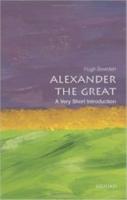
OUP (2014) p/b 120pp £7.99 (ISBN 9780198706151)
The temptation to tell the story of Alexander—and by that one means a narrative distilled from the riches of the Alexander historians (Diodorus Siculus, Quintus Curtius Rufus, Plutarch, Arrian, Justin)—must have been immense. It’s all there: the drama, heroics, mysticism and magic, the character flaws; but this is precisely the problem, and one which B. is clear at the outset will not draw him into producing another hero/villain hagiography based on the very Roman perspectives of Roman authors, or authors for Romans.
Instead he looks at what his contemporaries thought of Alexander the Great, and to do so uses original documents such as letters from Afghan officials Egyptian temple records, Babylonian diaries, inscriptions, speeches and so on, and this produces some wonderful material. For example, the priests were not at all happy about Alexander’s second entry into Babylon in 323 BC because of a lunar and solar eclipse. Whether this deterred Alexander or not, he certainly did enter the city. We are told in Diodorus, Plutarch and Arrian of a madman seen sitting on the throne wearing Alexander’s royal gown and diadem, and that that was prescient of Alexander’s death. But it is possible that a ritual called ‘the substitute king’, which occurs in Assyrian texts, was performed to protect Alexander. It involved the temporary abdication of the king for 100 days, after which the substitute is executed and the true king takes over again safe and sound. Though not in Babylonian documents, Dio refers to such a Persian custom, and Babylon could well have adopted it from the Assyrians.
B.’s approach, because of his stated goal, is thematic, which, though teasing out aspects of Alexandrian history that others might miss, does create problems, especially for the uninitiated reader, with, for example, chronology. Again, take the case of Babylon, to which a chapter is dedicated. Alexander’s entries in 331 and 323 are dealt with next to each other, as well as in the rest of the text, in something nearer to chronological order. This could confuse, and teachers should advise their charges to refer continuously to the excellent and detailed timeline (two and a half pages of it).
B. begins with a discursus on the Achaemenid empire and Macedonia up to and including Philip II’s rule, thence into Alexander’s career, his impact on his world and contemporary perceptions of him, to how he was perceived over the centuries after his death. It’s an interesting read for those who do know something of Alexander, as well as for initiates, and at £7.99 is another real bargain.
Adrian Spooner
